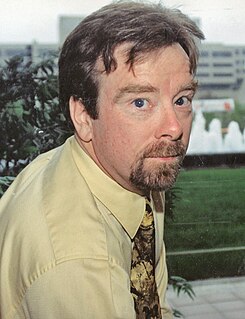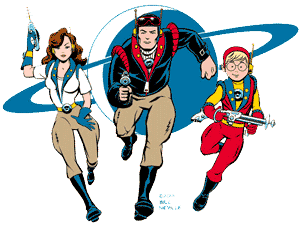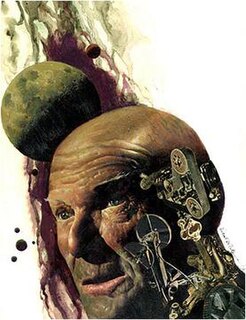
Children of Dune is a 1976 science fiction novel by Frank Herbert, the third in his Dune series of six novels. It was originally serialized in Analog Science Fiction and Fact in 1976, and was the last Dune novel to be serialized before book publication.

Franklin Patrick Herbert Jr. was an American science-fiction author best known for the 1965 novel Dune and its five sequels. Though he became famous for his novels, he also wrote short stories and worked as a newspaper journalist, photographer, book reviewer, ecological consultant, and lecturer.

Hugo Gernsback was a Luxembourgish–American inventor, writer, editor, and magazine publisher, best known for publications including the first science fiction magazine. His contributions to the genre as publisher—although not as a writer—were so significant that, along with the novelists H. G. Wells and Jules Verne, he is sometimes called "The Father of Science Fiction". In his honour, annual awards presented at the World Science Fiction Convention are named the "Hugos".

Frank Kelly Freas was an American science fiction and fantasy artist with a career spanning more than 50 years. He was known as the "Dean of Science Fiction Artists" and he was the second artist inducted by the Science Fiction Hall of Fame.

Kevin James Anderson is an American science fiction author. He has written spin-off novels for Star Wars, StarCraft, Titan A.E. and The X-Files, and with Brian Herbert is the co-author of the Dune prequel series. His original works include the Saga of Seven Suns series and the Nebula Award-nominated Assemblers of Infinity. He has also written several comic books, including the Dark Horse Star Wars series Tales of the Jedi written in collaboration with Tom Veitch, Dark Horse Predator titles, and The X-Files titles for Topps. Some of Anderson's superhero novels include Enemies & Allies, about the first meeting of Batman and Superman, and The Last Days of Krypton, telling the story of how Superman's planet Krypton came to be destroyed.

Dune is a 1965 science-fiction novel by American author Frank Herbert, originally published as two separate serials in Analog magazine. It tied with Roger Zelazny's This Immortal for the Hugo Award in 1966, and it won the inaugural Nebula Award for Best Novel. It is the first installment of the Dune saga; further, in 2003, it was cited as the world's best-selling science fiction novel.
The Hugo Award for Best Novel is one of the Hugo Awards given each year for science fiction or fantasy stories published in, or translated to, English during the previous calendar year. The novel award is available for works of fiction of 40,000 words or more; awards are also given out in the short story, novelette, and novella categories. The Hugo Awards have been described as "a fine showcase for speculative fiction", and "the best known literary award for science fiction writing".

Dune is a science fiction media franchise that originated with the 1965 novel Dune by Frank Herbert and has continued to add new publications. Dune is frequently cited as the best selling science fiction novel in history. It won the inaugural Nebula Award for Best Novel in 1965 and the 1966 Hugo Award, and was later adapted into a 1984 film and a 2000 television miniseries. Herbert wrote five sequels, and the first two were presented as a miniseries in 2003. The Dune universe has also inspired some traditional games and a series of video games. Since 2009, the names of planets from the Dune novels have been adopted for the real-world nomenclature of plains and other features on Saturn's moon Titan.

Michael Whelan is an American artist of imaginative realism. For more than 30 years, he worked as an illustrator, specializing in science fiction and fantasy cover art. Since the mid-1990s, he has pursued a fine art career, selling non-commissioned paintings through galleries in the United States and through his website.

Frank Wu is an American science fiction and fantasy artist living in Dedham, Massachusetts. He won the Hugo Award for Best Fan Artist four times, in 2004, 2006, 2007 and 2009.
John Carl Schoenherr was an American illustrator. He won the 1988 Caldecott Medal for U.S. children's book illustration, recognizing Owl Moon by Jane Yolen, which recounts the story of the first time a father takes his youngest child on a traditional outing to spot an owl. He was posthumously inducted by the Science Fiction and Fantasy Hall of Fame in 2015.

James Patrick Kelly is an American science fiction author who has won both the Hugo Award and the Nebula Award.
Charles Leonard Harness was an American science fiction writer.

Jim Burns b. 10 April 1948, is a Welsh artist born in Cardiff, Wales. He has been called one of the Grand Masters of the science fiction art world.

The 62nd World Science Fiction Convention (Worldcon) was Noreascon 4, which was held in Boston, Massachusetts, from September 2–6, 2004. The venues for the 62nd Worldcon were Hynes Convention Center, Sheraton Boston Hotel and Boston Marriott Copley Place. The convention was organized by Massachusetts Convention Fandom, Inc., and the organizing committee was chaired by Deb Geisler.

Vincent Di Fate is an American artist specializing in science fiction, fantasy and realistic space art illustration. He was inducted by the Science Fiction Hall of Fame on June 25, 2011.
The 20th World Science Fiction Convention, also known unofficially as Chicon III, was held August 31–September 3, 1962, at the Pick-Congress Hotel in Chicago, Illinois, United States.
The 24th World Science Fiction Convention, also known as Tricon, was held 1–5 September 1966 at the Sheraton-Cleveland in Cleveland, Ohio, United States. Officially, the convention was hosted by three cities in the region: Cincinnati, Cleveland, and Detroit, — hence the name "Tricon".
The 28th World Science Fiction Convention, also known as Heicon '70, was held 20–24 August 1970 at the Stadthalle Heidelberg in Heidelberg, West Germany.

The Dune prequel series is a sequence of novel trilogies written by Brian Herbert and Kevin J. Anderson. Set in the Dune universe created by Frank Herbert, the novels take place in various time periods before and in between Herbert's original six novels, which began with 1965's Dune. In 1997, Bantam Books made a $3 million deal with the authors for three Dune prequel novels, partially based upon notes left behind by Frank Herbert, that would come to be known as the Prelude to Dune trilogy. Starting with 1999's Dune: House Atreides, the duo have published 11 Dune prequel novels to date. In 2011 Publishers Weekly called the series "a sprawling edifice that Frank Herbert’s son and Anderson have built on the foundation of the original Dune novels." Jon Michaud of The New Yorker wrote in 2013, "The conversion of Dune into a franchise, while pleasing readers and earning royalties for the Herbert estate, has gone a long way toward obscuring the power of the original novel."













